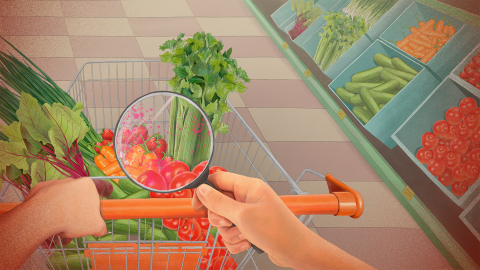
In a groundbreaking investigation, ICFJ Knight Fellow Fabiola Torres and her team at Salud con lupa have uncovered alarming findings in Peru. Their report, "A hidden poison on my plate," found that more than 30 pesticides, known to be harmful to health, are present in fruits and vegetables sold by six of Peru's largest supermarket chains. Now, because of Salud con lupa, the Peruvian government is taking action.
After the investigation was published in April, a new bill banning dangerous pesticides was introduced to Congress. The proposed legislation cited multiple times the research led by Salud con lupa in partnership with the Consortium for Health, Environment and Development (Ecosad), the Organic Agriculture Network (RAE Peru) and the Peruvian Agroecological Consortium (CAP).
The team collected produce samples and sent them to labs for testing. It was the first collaborative investigation of its kind in Peru, Torres said.
“We revealed a major public health problem affecting food quality for millions of Peruvians,” Torres said. “This shows why investigative journalism like this is so important: It can help safeguard people's health.”
The investigation also sparked nationwide conversations. The Peruvian Association of Consumers and Users made an official declaration after the report came out, and three prominent Peruvian newspapers published editorials on the subject. Salud con lupa’s publications, videos and infographics related to the investigation reached over 6 million users, and more than 20 news outlets cited their work.
In addition to the bill, Salud con lupa and allied organizations were invited to meet with multiple public institutions to present the results of the investigation and propose possible solutions. After these meetings, the institutions formally requested the information published by Salud con lupa and promised to propose concrete solutions in collaboration with Salud con lupa’s partner organizations, which helped carry out the pesticide monitoring.
To conduct the investigation, Salud con lupa and their partners randomly purchased 84 samples from eight types of produce sold by six of Peru’s largest grocery store chains. These samples were then dispatched to two laboratories in Lima that carried out a comprehensive analysis for multiple pesticide residues. The laboratory findings unveiled a concerning trend: All six of the supermarket chains sold produce that exceeds the maximum residue limit established by Peruvian regulations. Of the samples analyzed, 51 contained high pesticide levels. The chemicals ranged from those posing minimal health risks to those classified as highly dangerous by the World Health Organization (WHO). Salud con lupa and its partners are now working on a second investigation analyzing pesticide presence in other regions of Peru.
In 2019, Torres created the health reporting platform Salud con Lupa (“health under a magnifying glass”) as part of her ICFJ Knight Fellowship. Salud con Lupa is the region’s first news site devoted exclusively to health reporting. In addition to their extensive work on the COVID-19 pandemic, Torres and her colleagues debunk health misinformation, cover mental health, delve into gender issues as they relate to health, and more.